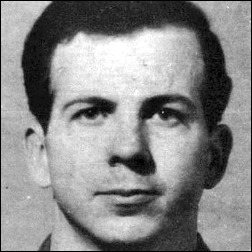BOB GARFIELD: The day of JFK’s burial, another funeral was held, in Fort Worth, Texas, where a small gathering committed the remains of Lee Harvey Oswald to the ground. Apart from the immediate family consisting almost entirely of women and children, no mourners attended, leaving the task of carrying the coffin to the few assembled strangers. Those strangers were reporters, present at Rose Hill Cemetery to cover the funeral. Retired Associated Press reporter Mike Cochran was one of those men, and in an article this week, he told the story of that day.
MIKE COCHRAN: One of my colleagues from the Fort Worth Star-Telegram, he said, you know, Cochran, if we’re going to write a story about the burial of Lee Harvey Oswald, we’re gonna have to bury the son-of-a-bitch ourselves.
BOB GARFIELD: You at first resisted.
MIKE COCHRAN: That’s correct. I did not want to be a pallbearer for Lee Harvey Oswald. I was very much a Kennedy-crat. I changed my mind very quickly when a UPI reporter, United Press International –
[BOB LAUGHS]
- a friend but very much a competitor stepped forward and said that he would be a pallbearer. And [LAUGHS] it only took me about a half a second to realize that I couldn’t let a UPI reporter be a pallbearer and an AP writer not be a pallbearer. The AP and UPI were at each other’s throats 24 hours a day.
BOB GARFIELD: Now Mike, one of the cardinal rules of journalism is for the reporter not to be involved in the story. In the last 50 years, how have you processed that bizarre turn of history?
MIKE COCHRAN: I don't think any of us really thought about it that much at the time. But ten years later, Jerry Flemmons from the Star-Telegram, a fellow pallbearer, he came in my office and he said, Cochran, he says, guess what, he said, I just got a call from a Chicago newspaper and they wanted to interview me for being a pallbearer. [LAUGHS] And I says, oh, you’re kiddin’ me. He says, no. And he says, you’re gonna get a call too because I gave him your name. So it wasn’t something that we dwelled on or thought about or – and then, of course, as years went on, with the anniversaries it became a little bit more significant.
The other night, I went to a JFK remembrance at the Texas theater in Dallas. One of the gentlemen in the theater, he took me over to a spot and he said, this is where Oswald was arrested. I stood there for a couple of minutes. It was probably one of the most emotional moments in the 50 years. No, I have little good to say about or feel about Lee Harvey Oswald. [SIGHS] It’s just changed certainly my life, and everything else.
BOB GARFIELD: All right, Mike. Thank you very much.
MIKE COCHRAN: Well, you’re certainly welcome. I’ve enjoyed talking with you.
BOB GARFIELD: Mike Cochran was a correspondent for the Associated Press in Fort Worth, Texas in 1963. He retired from the company in 1999.
[MUSIC UP AND UNDER]
That’s it for this week’s show. On the Media was produced by Alex Goldman, PJ Vogt, Sarah Abdurrahman, Chris Neary, Laura Mayer and Khrista Rypl. We had more help from Megan Teehan and Zac Spencer. And the show was edited – by Brooke. Our technical director is Jennifer Munson. Our engineers this week were Andrew Dunne and Ken Feldman.
BROOKE GLADSTONE: Katya Rogers is our Senior Producer. Jim Schachter is WNYC’s Vice President for News. On the Media is produced by WNYC and distributed by NPR. This week, go to our website and listen to the greatest hits from our new blog and podcast, TLDR. I’m Brooke Gladstone.
BOB GARFIELD: And I’m Bob Garfield.

